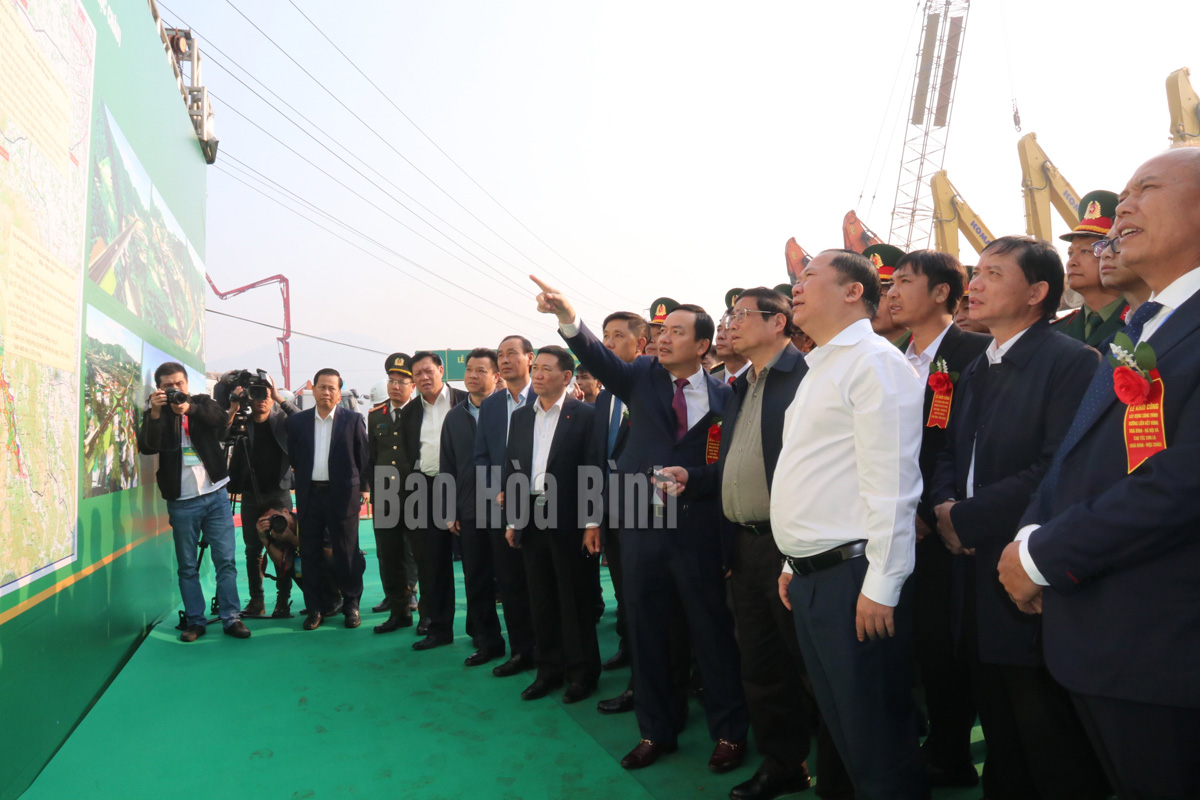
(HBO) – The Hoa Binh provincial People’s Committee held a ceremony on February 26 to start the construction of a road connecting Hoa Binh and Hanoi, and the Son La Expressway section linking Hoa Binh and Moc Chau district of the neighbouring province of Son La.
The
event, held in Du Doi hamlet of Hoa Binh city’s Mong Hoa commune, was attended
by Prime Minister Pham Minh Chinh, Minister of Finance Ho Duc Phoc, and Auditor
General of the State Audit Office of Vietnam Ngo Van Tuan. Local officials
present at the ceremony included Nguyen Phi Long, alternate member of the Party
Central Committee and Secretary of the provincial Party Committee; Bui Duc
Hinh, Standing Deputy Secretary of the provincial Party Committee and Chairman
of the provincial People’s Council; and Bui Van Khanh, Deputy Secretary of the
provincial Party Committee and Chairman of the provincial People’s Committee.
Prime
Minister Pham Minh Chinh and central and local officials press the buttons to
launch work on the Hoa Binh - Hanoi road and Son La Expressway project.
The Hoa Binh - Hanoi road and Son La Expressway
(Hoa Binh - Moc Chau) project have a total investment of 4.12 trillion VND
(173.2 million USD). The first section is 31.48km long and the second, 12.35km,
including Hoa Binh 5 Bridge which will be built in another project.
The first section is invested with almost 1.83
trillion VND funded by the central budget and the province’s budget for the
2021 - 2025 period. It will be built from 2022 to 2027.
This is a key project of Hoa Binh province that
aims to form a transport network connecting regions, thereby helping reduce the
distance and travel time on the Hanoi - Hoa Binh city - Kim Boi route, and
enhance the connectivity of Ha Nam, Hoa Binh, Phu Tho, and Son La provinces
with the national transport infrastructure system. Besides, it is also expected
to create conditions for tapping into the potential and advantages for service
and tourism development in Kim Boi district, as well as boosting socio-economic
development in Hoa Binh province.
Addressing the event, Prime Minister Pham Minh
Chinh affirmed that building socio-economic infrastructure, especially uniform
and modern transport one, will serve as a stepping stone for Hoa Binh province
to develop and become an important transport gateway linking with Hanoi and
neighbouring provinces.
He stressed the importance of the Hoa Binh - Hanoi
road and Son La Expressway (Hoa Binh - Moc Chau) project to regional
connectivity, and assigned tasks to relevant parties.
The leader expressed his belief that residents
in the localities traversed by the route will uphold their tradition like
during the construction period of the Hoa Binh hydropower plant to give
wholehearted support so that the project can be completed early./.
Hoa Binh province is undergoing a dynamic transformation amid Vietnam’s national digital transition. Building on Poliburo’s Resolution No. 57-NQ/TW on breakthroughs in science, technology, innovation, and national digital transformation, the province has rolled out a wide range of practical action plans. A standout initiative is the "Digital Literacy for All” movement, an effort to ensure that no one is left behind in the digital era.
Hoa Binh province is undergoing a dynamic transformation in the wake of the national digital transformation movement. Building on Resolution No. 57-NQ/TW of the Politburo on breakthroughs in science, technology, innovation, and national digital transformation, the province has implemented a wide range of practical action plans. A standout initiative is the "Digital Literacy for All” movement ambitious effort to ensure that no one is left behind in the digital age.
With a spirit of unity and proactive problem-solving, the Party Committee, the government and the people of Dong Lai Commune (Tan Lac District) have made great strides in implementing the resolutions of the 24th Party Congress of the commune for the 2020 - 2025 term. Focusing on leadership and practical actions, the commune has brought the Party’s resolutions into daily life, creating strong impacts and pushing the local development forward.
Amid the nationwide push for digital transformation, young people in Hoa Binh Province are stepping up as dynamic pioneers, applying technology to enhance Youth Union operations and expand the reach of youth-led initiatives. Through creativity and adaptability, Youth Union organizations at all levels have introduced a series of practical solutions, contributing to modern governance and community development.
In recent years, An Nghia commune, located in Lac Son district, has stepped up administrative reform, focusing on improving the quality and efficiency of its single-window service unit for receiving and processing administrative procedures. These improvements have helped create favourable conditions for local residents and organisations to handle administrative procedures, contributing to the commune’s broader socio-economic development.
The Prime Minister-approved master plan to develop the multi-use value of forests ecosystems through 2030, with a vision to 2050, aims to improve the management and sustainable use of forest resources, create jobs, increase incomes, and improve the living standards of ethnic minorities, people in mountainous and remote areas, forest workers and those living near forests.



